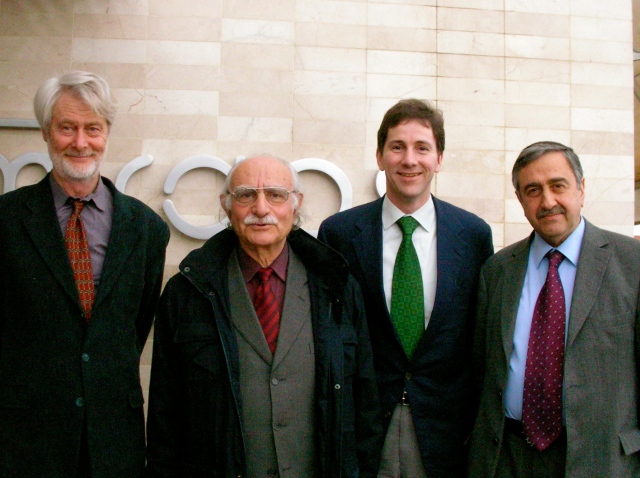 Akinci’s victory: a salute to Cypriot reunification
Akinci’s victory: a salute to Cypriot reunification
by Neophytos LOIZIDES for Open Democracy
6 May 2015
A couple of years back few would expect that a retired politician associated with a small leftist party would make a resounding comeback to politics. But the Cypriot public has questioned partition again and again by electing prominent pro-unification figures.

Sharing Lessons from Nicosia at the Forum of Cities in Transition: from the left Padraig O’Malley (University of Massachusetts), Lellos Demetriades, Allan Leonard (Northern Ireland Foundation) and Mustafa Akinci. (c) Allan Leonard
The landslide victory of Mustafa Akinci with a 60.3 percent of the vote brought renewed hopes for the settlement of the Cyprus problem. Rightly so, but to be successful both leaderships in Cyprus should avoid the mistakes of past failures to reunify Cyprus.
Akinci is widely known for serving as the mayor of the Turkish Cypriot sector of divided Nicosia. In the early 1980s, him and Lellos Demetriades resorted to anad hoc set of arrangements to address the city’s impending environmental disaster in the absence of a sewer system.
Leaving formalities aside (even reframing from signing any contract), the two mayors agreed to call themselves representatives rather than mayors of the city and managed to upgrade the city’s sewer system, making the first step to Nicosia’s reunification. The two mayors relied not only on their undeniable charisma but also on expert advice to alert the public of the imminent dangers of an looming environmental crisis.
The Akincis are well respected among Greek Cypriots as Mustafa and his wife Meral have supported peace initiatives for decades. Meral Akinci has been a main organizer for WinPeace (Women’s Initiative for Peace) providing high school students from Greece, Turkey and Cyprus an opportunity to participate in conflict resolution workshops.
Following their retirement from politics, Mustafa and Lellos Demetriades have travelled across the world from Mitrovica to Derry/Londonderry to share Nicosia’s lessons for other cities in transition.
A couple of years back few would expect that a retired politician associated with a small leftist party would make a resounding comeback to politics. But the Cypriot public has questioned partition again and again by electing prominent pro-unification figures. Leaders however have yet to turn this public mandate into a publically endorsed peace settlement. This is not uncommon in divided societies especially those in problematic geopolitical neighborhoods. Often the presence of eager and pro-reconciliation leaders cannot overcome prohibitive conditions on the ground, as demonstrated in the 1990s in Sri Lanka and Israel/Palestine or more recently in Georgia and Colombia. Turning to Cyprus, one could rightly point that Akinci’s victory is paved with obstacles given Ankara’s unpredictability especially following the June 2015 elections.
Given these difficulties, both Akinci and Anastasiades will have to maintain strong domestic support within their publics. The Anastasiades-Eroğlu joint statement in February 2014 included as one of its provisions that the ‘leaders will aim to reach a settlement as soon as possible, and hold separate simultaneous referenda thereafter.’ In essence, the joint statement confirmed what was already the general expectation. On the positive side, a referendum will add to the legitimacy of the peace settlement but on the negative it might come too late in the process. A late referendum poses counter-incentives particularly for the Greek Cypriot side not to proceed forcibly with negotiations. Perhaps rightly so, many Greek Cypriots feel that a second failure attributed to them will lead to the permanent partition of Cyprus.
To avoid past mistakes, Akinci and Anastasiades should avoid negotiations behind closed doors. They should broaden the negotiations to include opposition parties and civil society actors in the mediation particularly municipalities representing refugees. Akinci has made the return of Varosha to its original Greek Cypriot inhabitants a central theme of his campaign. It is perhaps an unprecedented political opportunity for a more active involvement of the Famagustians combining an effective international diplomacy to support their cause with the appropriate legal/political formula to incentivise Turkish Cypriot cooperation.
Likewise, the flourishing bicommunal contacts between the two communities could be a supporting factor in these mediations. Still though, the de facto division of Cyprus prevents daily communication for the overwhelming majority of Cypriots particularly those mostly affected by the financial crisis.
In the absence of such contacts, it is important to engage the public early in effective consultation processes. A preparatory mandate referendum asking the public to endorse the guiding principles of the settlement could pave the direction and priorities for future negotiations. And as the name suggests, mandate referenda – when successful – give leaders a directive to continue and take decisive steps towards a peaceful settlement. Such a referendum took place in South Africa in 1992; it called upon the white minority to endorse or reject President de Klerk’s reform policies.
Likewise, in Cyprus keeping the public engaged, informed and committed will reinforce the final ratification of the settlement. Akinci’s victory is a salute to peace but only the beginning of a long process of winning hearts and minds for Cypriot reunification.
Originally published at https://www.opendemocracy.net/can-europe-make-it/neophytos-loizides/akinci%E2%80%99s-victory-salute-to-cypriot-reunification
